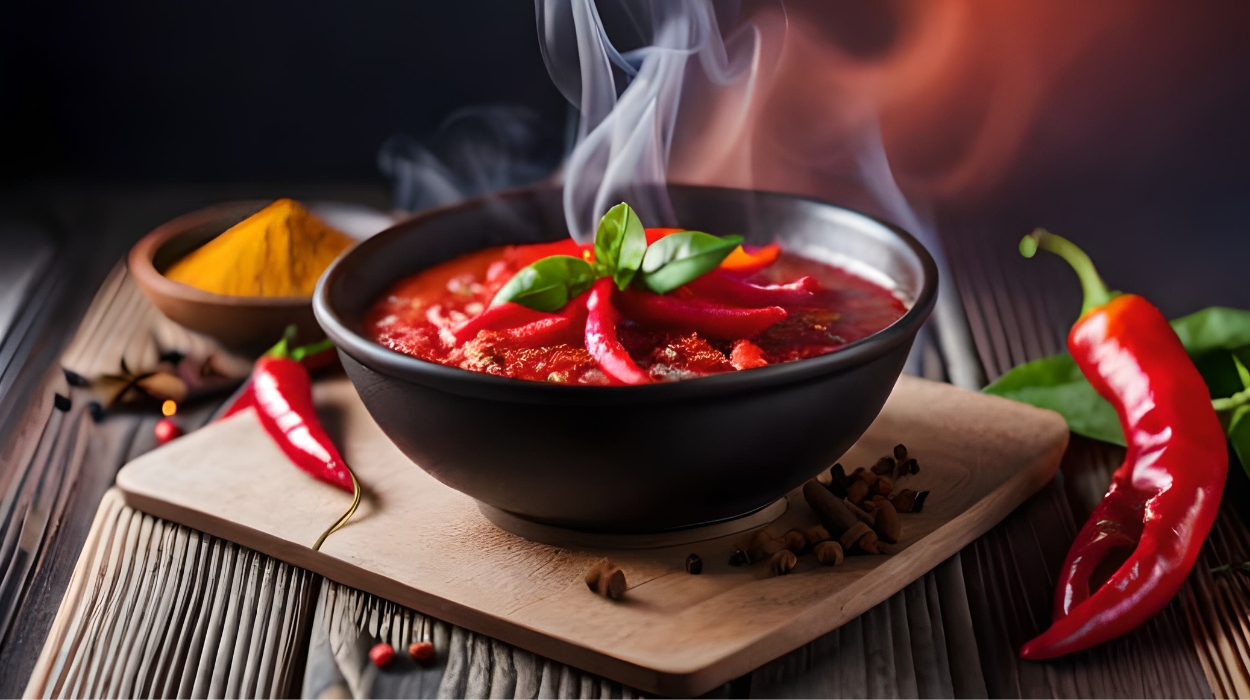Spicy food has been a hot topic regarding weight loss strategies. The buzz around the potential benefits may certainly influence individuals to ask, “Do spicy foods help you lose weight?”
While many strategies can work for effective weight loss outcomes — understanding key components, such as knowing what foods to avoid or limit in your diet, can significantly influence your results.
Popular inclusions of spicy foods in meals include hot sauces, chili peppers, and others like turmeric, cumin, cinnamon, and ginger. What gives these foods the spicy taste or, sometimes, serious heat is the compound capsaicin.[1] Aside from enhancing the flavors of a meal, this spicy compound may even provide various positive health effects.
Of course, a healthy diet and lifestyle factors are essential for effective weight loss outcomes — but eating spicy foods may enhance this. Does spicy food help you lose weight? Continue reading to find out.
Does Spicy Food Help You Lose Weight?
Spicy foods can help you lose weight; however, this will depend on whether you have achieved and maintained various other key lifestyle factors essential for weight loss. Spicy foods can support weight loss by increasing energy expenditure, satiety, and fat oxidation, promoting healthier eating patterns and gut health, and reducing salt and energy intake.
Do Spicy Foods Help You Lose Weight?

With so much attention paid to spicy foods for weight loss and health benefits — it might seem like a missed opportunity if you don’t choose to eat spicy food. So whether or not spicy foods are up to their thermogenic potential in body weight loss is a worthwhile question.
Spicy food consumption[2] has been linked to positive effects on weight management and body fat markers. However, various other lifestyle factors need to be met for optimal results. Achieving a calorie deficit or negative energy balance is the most critical factor in reducing weight.
A negative energy balance can be achieved when you eat fewer calories and regularly exercise. Other lifestyle aspects[3] such as maintaining a healthy diet, eating ample amounts of fruits and vegetables, ensuring enough sleep, and being mindful of stress levels are all important considerations that can heavily influence results.
Spices like red pepper, cinnamon, ginger, garlic, and turmeric have all been shown to affect[4] energy metabolism,[5] body weight, and fat oxidation.[5] Including these particular spices will help increase energy expenditure and contribute to body fat loss.
Consuming Spices With Lifestyle Modifications
A combination of lifestyle factors that include spices will ultimately promote effective weight loss outcomes:
- Consuming spicy foods associated with thermogenesis can help increase your metabolism, energy expenditure,[6] and fat oxidation.[5]
- Everyday staples like garlic, ginger, and cinnamon are recognized for their potent compounds that can influence body fat[7] stores.
- Using thermogenic spices as flavor enhancers instead of adding salt to your meals can help reduce salt intake and encourage healthier eating habits, further supporting weight loss.
- Including more spices, like turmeric, cinnamon, cayenne pepper, ginger, and cumin, in your diet could also encourage creativity with meals and lead to a more diverse food intake.
How Does Spicy Food Help You Lose Weight?

While spicy foods won’t directly cause weight loss, they may enhance outcomes. Let’s break down some key points to help explore and answer the question: Does spicy food make you lose weight?
Influence Metabolism
Spices like cinnamon have been touted for their potential to boost metabolism, which can play a role in weight loss. An elevated metabolism can increase energy expenditure, which is paramount for losing weight. Research shows common spices like chili, ginger, and cinnamon have favorable effects on metabolism[8] and other key health markers.
Reducing Energy Intake
Consuming spicy food with herbs like chili peppers may influence total energy intake. In particular, the compound capsaicin is likely the contributing factor in decreasing intake and may promote feelings of satiety.[9] Energy intake is a vital component for weight loss; even just small amounts of things like hot sauce added to your spicy food consumption can ultimately add up over time, influencing results.
Reduced Salt Intake
Diets high in salt[10] are typically associated with poor health outcomes and higher body weight. Therefore, substituting spices or hot sauces for salt could support a healthier body weight and optimal health.
Reduced Inflammation
Long-term inflammation[11] can disrupt the normal functioning of the metabolic system, contributing to weight gain and further progression in overweight or obesity. Spices are among the highest antioxidant-containing[12] foods, and their bioactive compounds work against inflammatory markers in the body.
Curcumin,[13] a compound in turmeric, has been demonstrated to possess many protective properties, including acting as an effective anti-inflammatory modulator.
Moreover, ginger[12] has been another particular spice in the focus of scientific studies, which has also demonstrated improvements in inflammation.
Improved Gut Health
Optimal gut composition[11] is essential for gut functioning and is crucial in weight management. Altering gut composition can, therefore, positively or negatively influence aspects of health, such as obesity.
Including various spices in your diet can positively contribute to gut health through the beneficial compounds they contain. Garlic, often considered a spice and vegetable, provides prebiotic effects[14] that are proven beneficial for gut health. While cinnamon[15] supports digestion, which can help ease abdominal pain, some spicy foods may aggravate[16] irritable bowel syndrome.
Anti-Obesity Effects And Increased Fat Oxidation
The bioactive compounds[7] in common spices like cinnamon, ginger, turmeric, and garlic have been touted to provide anti-obesity effects. The various compounds present are stated to conduct these effects from their ability to reduce fat accumulation[7] in cells. Further, these compounds can interfere with the mechanisms involved in the process of fat storage itself.
Additionally, more research supports the effectiveness of chili pepper on fat oxidation and anti-obesity[17] effects by; influencing satiety, appetite, and thermogenesis and enhancing the production of beneficial compounds within the digestive system.
How To Spice Up Your Healthy Food
Whether you’re considering incorporating spices into your meals or are an avid spice consumer, here are a few simple ways to get creative. Focusing on healthy food intake is essential to support weight loss and optimal body weight.
Healthy ways to include spices in your food:
- Use spices such as hot peppers to season protein sources such as chicken and tofu, or add them to eggs.
- Add ground cinnamon to oatmeal for breakfast.
- Add cinnamon to a smoothie or protein shake.
- Add fresh ginger to a stir fry.
- Add a dash of spice or bell peppers to some roasted vegetables to enhance flavor and boost heart health.
Conclusion
Does eating spicy food help you lose weight? It can certainly contribute to weight loss; however, hopefully, it is clear that a combination of factors is required. Key lifestyle factors, including total energy intake, levels of physical activity, stress, and adequate sleep, can all significantly influence weight loss success.
Including spices in your diet to complement your weight loss journey can be straightforward. However, it’s important to remember that how you consume spicy food is also essential; if it is unhealthy food that’s high in energy, fat, and sodium, it can instead promote unfavorable effects on health and body weight.
Adding spices to your meals at home can be a fantastic approach to encourage healthier eating habits. If all elements required to lose weight are established and maintained, you could utilize additional strategies such as diet pills or well-researched, high-quality belly fat burners to aid results.
Frequently Asked Questions
Eating spicy food can help you burn more calories, as spicy foods can elevate metabolism.
Eating spicy foods every day could be okay, but it depends on what types of food you eat and if you have any digestive issues.
Yes, spicy food can be unhealthy, as spices can be used in high-calorie dishes and highly processed meals that are also often rich in saturated fat and sodium.
Spicy foods can be of varying intensities, which could have different levels of impact on your stomach.
Sweating from spicy food does not necessarily equal being good or bad for you, but rather a normal physiological response.
 Evidence Based
Evidence Based
